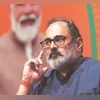The government is gearing up to launch the India AI programme soon, Minister of State for Electronics and Information Technology Rajeev Chandrasekhar said on Tuesday evening.
“The India AI programme will be a very well-funded, conceived and architected programme,” said Chandrasekhar virtually at the Nasscom Future Forge event 2023. “It will (take) the focus of our startup ecosystem on real-life use cases in agriculture, security and governance.”
The programme may be launched on December 11, according to industry sources. India will host a three-day global summit from December 12 related to AI in New Delhi. The Global Partnership on Artificial Intelligence (GPAI) summit will focus on various critical aspects of AI, including responsible AI, data governance, the future of work, and innovation and commercialisation.
"We hope the New Delhi Declaration will take forward the Bletchley Declaration in a more harmonised way," said Chandrasekhar. “This is being (done) through growth, expansion, innovation and investment, as well as safety and trust.”
The minister recently attended AI Safety Summit 2023, which was held in Bletchley Park, Buckinghamshire in the United Kingdom, where 28 nations, including the US and China, participated. The nations which participated in the summit agreed to the ‘The Bletchley Declaration’. The document underscores the importance of aligning AI systems with human intentions and encourages a more in-depth exploration of the full potential of AI.
Also Read
“Tech must be maximised for its good, innovation and growth,” said Chandrasekhar. “But certainly there have to be guardrails that deal with safety and trust and accountability of the tech platforms.”
However, there is a difference between how India is approaching this compared to other countries. He said that some countries are still trying to demonise AI.
“This cannot be a binary conversation where the regulation for safety and trust is so deep and intense that it kills innovation,” said Chandrasekhar. “For us, the priority is really about innovation and making AI the kinetic enabler of the digital economy.”
At the Nasscom event, Chandrasekhar was asked how the government is addressing the issue of access to data for startups, which is still a challenge. He was also asked about the issues related to data standardization in areas such as health, defence and banking. There is a challenge related to blanket policy for data as it needs to be specific for sectors.
Chandrasekhar said that the government is working on an AI strategy that consists of creating a significant computing infrastructure. It will be available as a service for startups to help them train their models.
“We have a draft document that will be converted into a cabinet note,” said Chandrasekhar. “We hope it to be cleared by the cabinet very soon. This is the crux of the India AI Programme.”
The government is working on a large programme that would provide curated access to datasets for the Indian research and startup ecosystem and the government.
“This is clearly by design not going to be available to the multinationals and the global brands,” said Chandrasekhar.
Chandrasekhar was also asked about the challenges Indian startups face while pitching their products to the government and large organisations. He said that the landscape of cybersecurity is expected to materially change in the next 6 months to benefit those who are creating made-in-India technology. This way the market for such technologies and products will also significantly expand in the coming months.
“The government now has a clear plan to secure its own digital workplace and footprint,” said Chandrasekhar.
Deep tech
Chandrasekhar also said that deep tech will play a significant role in the next wave of expansion of India’s startup ecosystem and innovation. He said that the country's digital economy has increased from 4.5-5 per cent of GDP (gross domestic product) in 2014 to 11.5 per cent today. It is expected to account for 20 per cent of the country’s GDP by 2026.
Back in 2014, the country was known to have a big presence in the IT and ITES space with top companies like Infosys, Wipro and TCS. Adding to that momentum, the country has created an innovation ecosystem that has focused significantly on the consumer internet space. This has been catalyzed by India’s Digital Public Infrastructure (DPI) and the digitization of the government and processes.
Chandrasekhar said the idea behind Digital India was not just to form unicorns, startups or next big ideas. The aim is that technology must transform the lives of Indians and governance and create a significantly globally competitive digital economy with lots of opportunities for youngsters. This includes India’s transformation from being a consumer of technologies to being an architect, producer and designer of devices, products and solutions for the world. India is building capabilities in areas such as semiconductors, Web3, artificial intelligence, high-performance computing and cybersecurity.
“Today we can lay claim to the fact that we have a presence in almost every segment of the tech ecosystem and the global digital economy,” said Chandrasekhar. “There is a clear strategy on the part of the government to create capabilities and competencies for (building), scalable and global standard startups and enterprises.”

)
